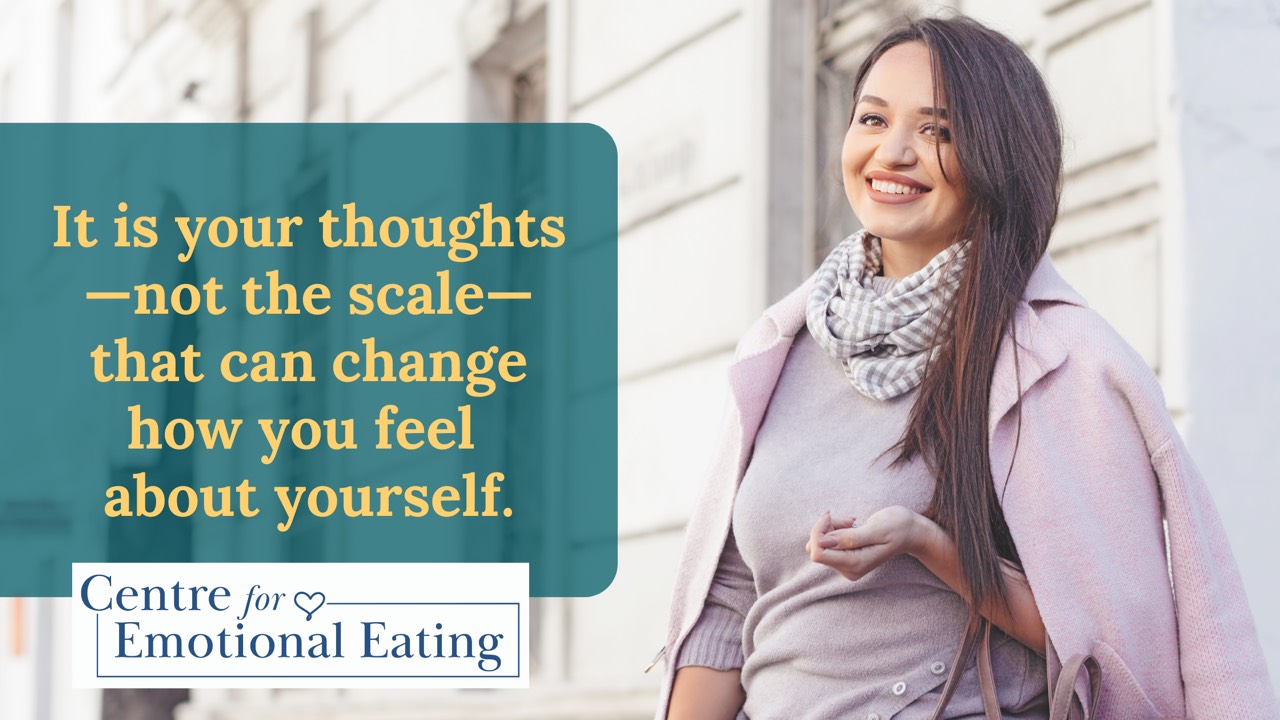BLOG
Find support not just for emotional eating, but all aspects of your well-being.
Aligning Your Values with Your Relationships

When it comes to supporting our mental health, we tend to start with the big things: the quality of our sleep, what we eat, going to therapy, taking medication. This can lead to more confidence and awareness which are powerful tools! But you might also begin to notice that working on yourself has shifted your relationships with others in ways you didn’t expect.
As you implement changes in your life and your perspective shifts, you might find you grow annoyed or feel critical towards others you usually have felt ok around. You might even feel like you can’t show or talk about who it is you’re becoming. Your immediate reaction might be to blame yourself, piling on the guilt that you’re a “bad friend” or a “bad person” because you’re thinking about others differently, even critically.
If you dig past those uncomfortable feelings, you’ll notice that it isn’t about them, but that getting clearer on your values (and setting boundaries that go along with them) means you no longer align with...
Client Insight: “I lost weight, but my brain still criticized my body size.”

The following blog posts talks about weight loss. If this is something that might bring up negative feelings for you, please skip this post to protect your mental and physical health.
Weight loss can happen for all kinds of reasons, from anxiety to happiness to stress to a change in routine. So, it should come as no surprise that emotional eaters come in all shapes and sizes! What I often hear from clients who have lost weight on their journey is that they still find themselves criticizing their body in the same way as when they weighed more.
Does that surprise you?
Many people I work with at the Centre for Emotional Eating believe that if they could just “get a handle” on their emotional eating that everything would all into place—their waistline would shrink, they’d be a kinder person, get that promotion, they’d finally do that thing they’ve always want to.
This is why dieting is so tempting: it markets itself as a cure-all when in reality it keeps you stuck in failure mode beca...
4 Self-Care Tips to Manage Seasonal Affective Disorder (SAD)

Seasonal Affective Disorder, or SAD, will look a little different for everyone. But if you notice you’re more irritable, your sleeping or eating patterns have changed, or you’re more anxious or depressed, you might be experiencing SAD.
We’re sharing four things that can help you find a mood boost in the darkest, coldest days of winter. We recommend creating a list you can easily reference, either in a notebook or on your phone’s notes app, of things that make you feel good. Either take inspiration from the ideas below or brainstorm your own! Personalizing an approach to support yourself through the next few months is a great way to show yourself some love.
Support
This can come in many forms, like a regular coffee date with a friend, scheduled therapy sessions, or speaking to your doctor about medication. Consider who in your life makes you feel supported and tap into that! If you feel intimidated going to the doctor, read this blog post for a little confidence boost.
Hygiene
When...
Examples of What to Say When a Doctor Only Focuses on Weight Loss

Going to the doctor can feel like more than just a chore. It might make your anxiety sky rocket as you face explaining your symptoms and feelings to someone you only see a handful of times a year.
If you exist in a body that doesn’t ‘fit’ into narrow definitions, like BMI, there might be added anxiety that you won’t be heard by those treating you because they can’t see past your body shape or weight. This is called weight bias in medicine. It is when a practitioner believes they know everything they need to know about you because you are classified as “overweight” or “obese” by their standards. They will often highlight or even pressure you to lose weight as a miracle cure-all to any and all issues.
That is simply not true.
Many people with higher body fat percentages live healthy lives with clean bills of health from blood work to digestion. And you deserve the same treatment from a practitioner that everyone else gets—to be seen, to be heard, to be understood.
Knowing all this...
4 Reminders for When Your Bathroom Scale Gets the Best of You

It can be so easy to get obsessed with the numbers on your bathroom scale and hop on/hop off every day or sometimes multiple times a day. You might be telling yourself that it’s “just to check in” but let’s look at your motivation a bit more closely:
If the number on the scale is higher than yesterday, do you have a bad day? End up picking yourself apart and vow to restrict what you eat?
Are you stepping on the scale more than once a day? Do you have set ‘rules’ for when you weigh yourself (for example, must be after using the washroom, must be without clothing, etc.)?
If you find yourself letting the number on the scale dictate your mood and actions, here are four reminders you need to hear. Feel free to print these out to read them when you need to, or even tape them on your bathroom mirror!
- It is normal for your weight to fluctuate during the day depending on what you’ve had to eat, drink, or if you’ve had a bowel movement. And if you’re a woman, you can expect your weight to ...
Tips to Feel Your Best During Bathing Suit Season

The summer ‘uniform’ is made up of shorts, tank tops, and sweating! All can make you feel uncomfortable if you struggle with body image. But perhaps the most dreaded of all is the bathing suit. At some point we go from children who love being in the water and playing in the sand without a second thought, to worry-charged and self-conscious adults who will actively avoid situations that require suiting up.
If this sounds like you, you’ll want to bookmark this post to come back to when you’re faced with a bathing suit event. Here are 4 tips to make you feel more comfortable (dare we even say confident!):
- You’ve heard it before but it bears repeating: no one is as concerned about your appearance as you are. We in no way want to discount experiences where someone something commented on your body. No one gets to do that and here’s what you can do if it happens. But we can be our own worst enemy when it comes to criticizing ourselves. Consult someone you trust, a partner or friend, who c ...
4 Spring Cleaning Tips For Your Mental Health

Have you ever noticed that when you wipe down the kitchen you immediately feel a sense of calm? Or maybe you love to light a candle during the cold, dark winter months. These are great examples of how small alterations to your environment can boost your mood in seconds. And we recommend finding more ways to add these things to your every day! It is a great way to tailor your environment, stack the deck if you will, to bring more joy and relaxation into your daily life.
You might think: “I don’t have the budget to upgrade my house!” While of course we’d all love to decorate or renovate our homes to fit our ideal dreams, you don’t have to go all out (and drop a lot of money) to see mental health benefits. You can try:
- Sparkle and shine. Let’s face it: cleaning the entire house feels overwhelming! Instead, shift your focus and make it your goal to clean only one room in your house. We suggest choosing the one you spend the most time in, so you get the most recharging bang for your buc ...
5 Tips to Like What You See in the Mirror

You may have seen yourself in our last blog post about body checking. It is the practice of monitoring and critiquing your appearance based on diet industry standards. Our tip there was to catch the negative thoughts in action and try and counter them.
In today’s post we’re going to take it to the next level: once you’ve caught that negative thought, how you can support yourself into creating a positive experience when looking in a mirror (either literally or in the form of comparison with other people’s bodies).
- Find the positive. After identifying the negative thought that came up, you might feel empowered to not only challenge it—saying it isn’t helpful—but to spin it into a positive. For example, instead of picking apart your thighs in the gym mirror, you could remind yourself that your legs just carried you through a workout! Focussing on what your body can do, instead of how it looks, can really start to reframe how you feel about your body.
- Dress in a way that feels good. C ...
What is Body Checking?

It might feel normal to pass by a store window and check out your reflection. But if you’re noticing more than simply adjusting your scarf or hat, you might be falling into body checking.
Body checking is any way you monitor your body’s appearance. This might look like:
- Pinching or pulling at skin to temporarily manipulate how your body looks.
- Examining your stomach in the mirror while trying to “suck in” as much as possible.
- Stepping on the scale often.
- Taking photos of your body constantly, swearing they will be your “before” photos.
- Comparing your body now to one you had as a teenager or to others around you.
You might even notice that these habits become even more frequent when you are stressed, feeling sad, or even just about to go on vacation! The issue with body checking is that you’ll never feel like you are measuring up to whatever you’re hoping for because it is a way of constantly critiquing your body. The diet industry doesn’t help us at all! Even if it changes i...
Client Insight: “I cleaned out my ‘skinny’ clothes from my closet and I love the result.”

For many of you who have been on the diet rollercoaster for years, you probably have collected two wardrobes: one you’re trying to feel good in now and the other is the clothes you hope to fit back into one day. You might even find yourself putting off buying clothes you feel your best in because you’re waiting to lose weight and don’t want to ‘waste’ the money.
Here at the Centre for Emotional Eating we hear this from clients often! Not only is there a wish to one day be the smaller size you were previously, a lot of the time you also have emotional ties to those clothes because of who you were when you wore them. For example, one client loved her blouses and pencil skirts because it reminded her of a time when she was happy in her career.
But getting rid of these clothes will not only free up real space in your closet it will also free up mental space. Here’s what we hear from clients once they’ve taken the plunge and cleaned out their closets of clothes that no longer fit them or ...


